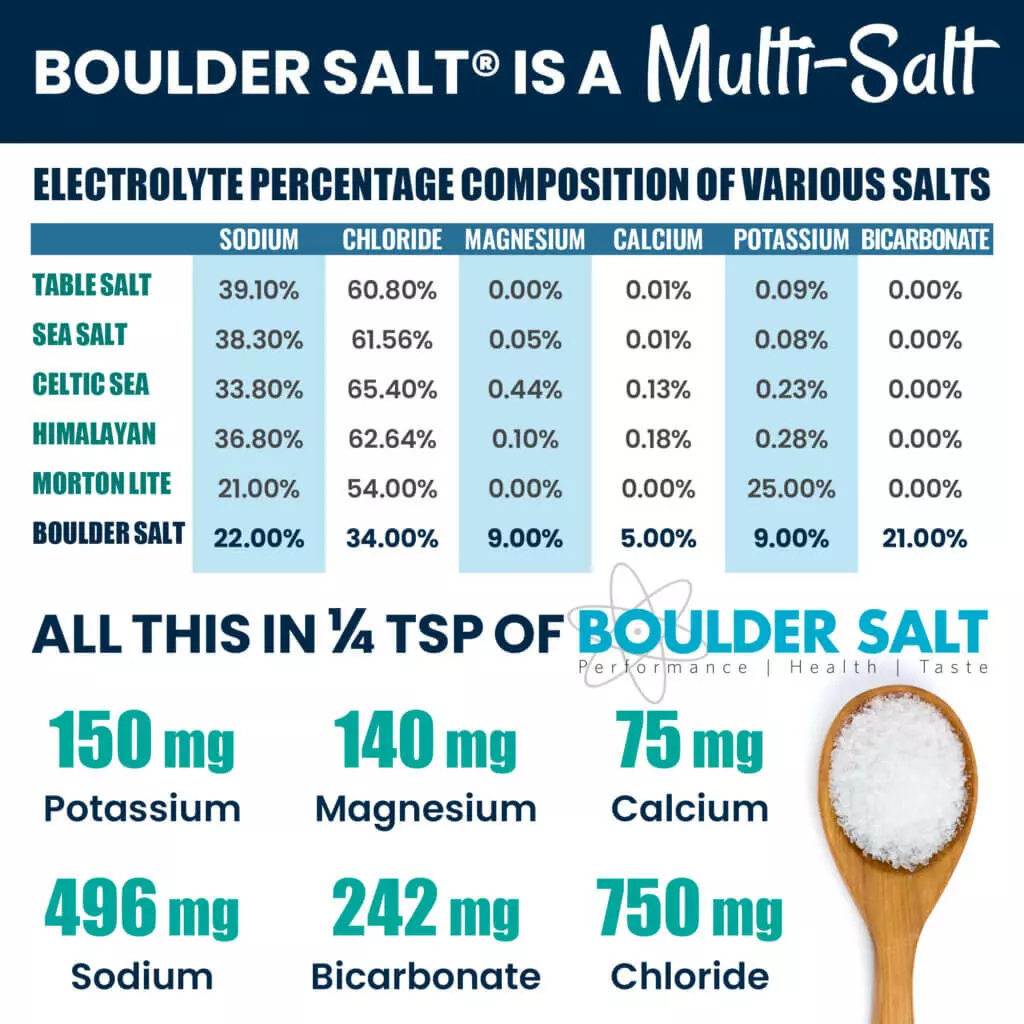Those with heart disease, hypertension and other blood pressure issues should be watching their salt intake. That’s because salt can drive up blood pressure and cause heart attacks and other problems, especially over a lifetime of excess salt consumption. It’s all due to an imbalance of sodium and potassium. The requirement for potassium is far greater than sodium, and most never get enough potassium. When was the last time you consumed the recommended dietary allowance for potassium … 4700mg? It’s a very high target to reach, few do. When you do, you do not have to worry about your sodium.
It may surprise you, but there are many types of salt out there, ranging from simple table salt to specialized salts that can be nutritional in their own right. But at the center of all salts is the sodium content. Most salts have between a 40 and 60 percent concentration of sodium, and a teaspoon of table salt contains about 2,300 mg of sodium — the max suggested daily intake of salt for the average person.
But if you’ll notice, that small teaspoon isn’t that much salt, and many foods are loaded with salt to keep them fresh and tasty, making it far too easy to have too much salt in a given day. Day after day and week after week, that salt surplus can start affecting your health in very serious ways.
That said, most table salt is fortified with iodine, and other salts, such as sea salt, may include other minerals such as calcium, magnesium and potassium, all of which can slightly affect taste. On the other hand, kosher salt is iodine free and contains no additives.
While everyone needs salt each day to exist and to optimize the body’s function, those with high blood pressure will need to watch their salt intake. Most adults need about 1,500 mg of sodium each day until about the age of 50, after which the daily requirement drops to 1,300 mg, with another drop to 1,200 after 70.
Generally, the sodium limit is 2,300 mg a day, though many people actually get closer to 3,000 mg a day due to poor diets and food choices. Those with high blood pressure need even less, and many experts recommend no more than 2,000 mg a day.
One of the best ways to positively affect your blood pressure is to reduce your sodium and increase your potassium…eat 5-7 servings of fruits and vegetables a day. Fruits and veggies are low sodium and high in potassium.
Others may turn to salt substitutes such as potassium chloride and potassium iodide, which are sodium free. Other salts known as half-salts or lite salts have roughly 50 percent less sodium, and they can be good options for those that are watching their salt intake. Some salts may simply be a blend of spices and herbs and contain no salt at all, and some people may prefer to flavor their foods with fresh herbs, lime or lemon juice, as well as garlic or ginger.
But while adding less salt to your meals can help you reduce your salt intake, more than three-quarters of all the salt we consume isn’t from the salt shaker, it’s from packaged foods and snacks like chips, fries and baked goods, not that main entree.
Instead of packaged foods and other goods that are laden with salt, those with high blood pressure need a salt alternative that won’t spike the sodium levels in the body. In fact, traditional table salt or sea salt has way too much salt (sodium) in it by volume to be very useful as a food additive, and it only takes a small amount to exceed the desired levels of sodium in the body. Making matters even worse, as sodium levels rise in the body, it can throw your other important electrolytes out of whack, reducing your performance and leading to other problems.
To remedy this, you need the best salt for high blood pressure: Boulder Salt. Table salt and sea salt are almost entirely made of sodium chloride while Boulder Salt contains 40% less sodium than that. The “Boulder Salt difference,” however, is not “less sodium.” Rather it is the inclusion of the ideal amounts of potassium, magnesium, and calcium that make Boulder Salt the potent nutritional asset that puts it in a category by itself compared to all other salts. Additionally, it also contains other useful electrolytes, just like your favorite nourishing beverages, and everything’s been optimized for athletic function and performance.
In addition to 496 mg of sodium, Boulder Salt contains 150 mg of potassium, 140 mg of magnesium, 75 mg of calcium, 242 mg of bicarbonate and 750 mg of chloride. With all the salts that the body needs, Boulder Salt is simply the best salt for high blood pressure and those that want to optimize their salt intake. Some people call it a special salt for high blood pressure — we just know that it helps get that optimum level of sodium for your needs.
Check out our online store here to buy your first bag today!
